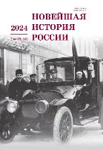Военное производство и трудовой коллектив завода имени Морозова в годы Великой Отечественной войны
Military Production and the Workforce of the Morozov Plant during the Great Patriotic War
Author(s): A. Yu. Davydov , O. A. BalandinaSubject(s): Business Economy / Management, Military history, Political history, Labor relations, Military policy, WW II and following years (1940 - 1949)
Published by: Издательство Исторического факультета СПбГУ
Keywords: plant; labor collective; Great Patriotic War; Soviet Union; Leningrad; evacuation; gunpowder production;
Summary/Abstract: The article deals with the activities of the labor collective of the Order of the Red Star of Morozov Plant no. 6 on the eve and during the Great Patriotic War. Its number, composition, problems of everyday life are investigated; attention is paid to production processes. An attempt is made to identify the system of moral values that united the collective into a single community during the hard times. The named enterprise played a significant role in the organization of the military economics of the Leningrad region. Meanwhile, there are no separate works devoted to analyzing the procedures of the plant’s functioning in 1941–1945. The authors of this article set out to fill this gap. They relied on the complexes of unexplored (or poorly studied) documents found in the following facilities of the Central State Archive of Historical and Political Documents of Saint Petersburg: the collective of the All-Union Communist Party of (Bolsheviks) of the Morozov Plant, the primary Komsomol organization of the state-owned Morozov Plant, the Leningrad Regional Committee and Urban Committee of the Party; other valuable materials were also analyzed. Identifying a number of significant shortcomings inherent in the disciplinary practices established at the plant before the war, the authors pay attention to the manifestations of consolidation of the factory workers during the war period into a comradeship aimed at overcoming organizational defects and capable of promptly responding to threats. The work traces how the labor collective adapted to the challenges posed by the harsh times, each of which is characterized in separate sections of the text. Adaptive practices led to the emergence of a style of effective interaction between management staff and workers.
Journal: Новейшая история России
- Issue Year: 14/2024
- Issue No: 48
- Page Range: 589-604
- Page Count: 16
- Language: Russian

